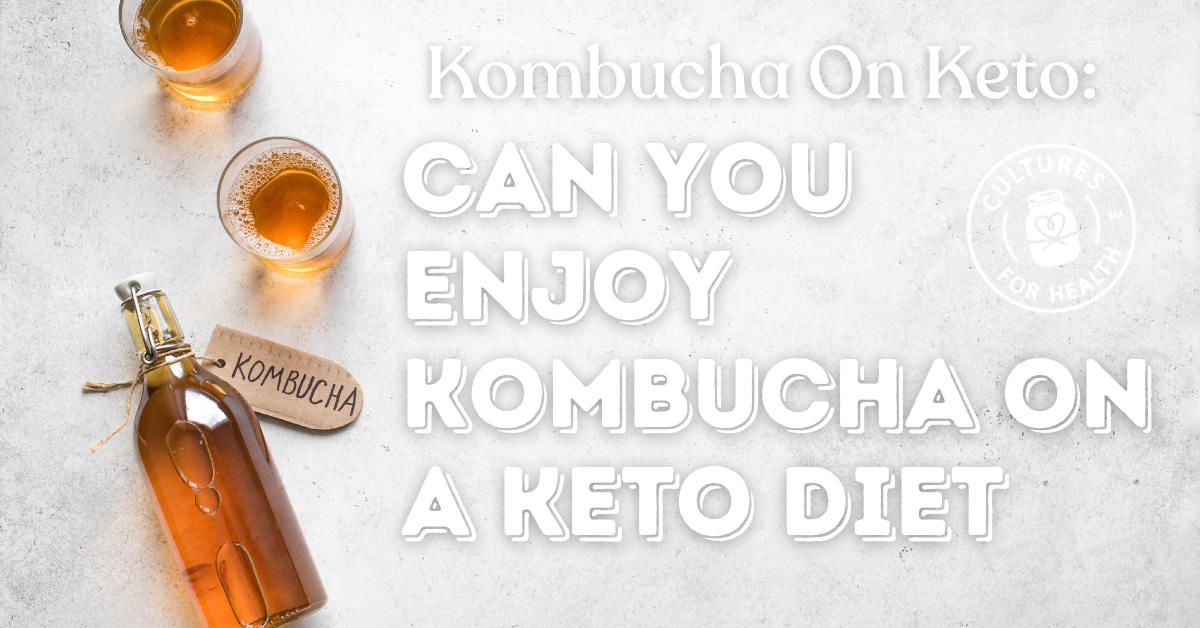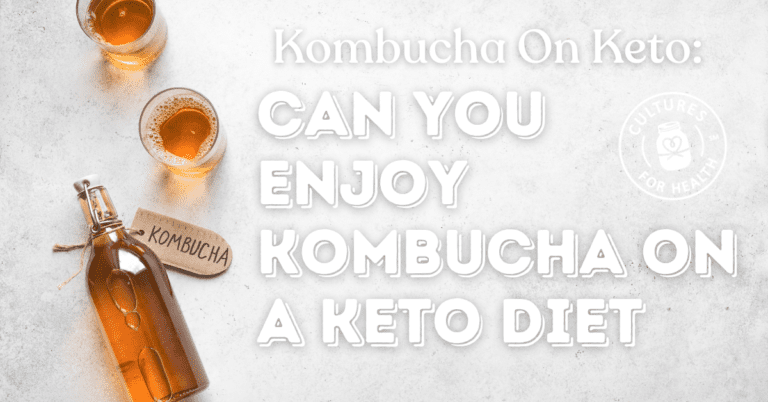
Kombucha has become the go-to drink for those looking for a refreshing and healthy alternative to sodas and sugary drinks.
But for those on a keto diet, the sugar content in kombucha raises concerns about whether it can accommodate a low-carb lifestyle. I’m often asked, “Can I drink kombucha on a keto diet?”
Well, to address this burning question, we’ve put together this easy-to-understand guide. Find all the answers here. So let’s explore some facts together.
Is Kombucha Keto Friendly?
The short answer is “yes”! Although kombucha does contain some sugar, it can be incorporated into a keto lifestyle if chosen carefully and in moderation. Let’s dig deeper to understand this better.
Kombucha:
Kombucha is made by fermenting sweetened black or green tea in a kombucha starter. The fermentation process produces a tangy, slightly effervescent drink rich in probiotics and other beneficial compounds. Some of the potential health benefits of kombucha include:
See also: What is a SCOBY?
Ketogenic diet:
Now, let’s talk about the ketogenic diet, also known as keto.
The keto diet is a low-carbohydrate, high-fat diet that has become increasingly popular in recent years. The goal of the keto diet is to put your body into a state of ketosis, where it burns stored fat for energy instead of carbohydrates. This may lead to rapid weight loss, improved cognitive function, and other potential health benefits.
Simply put, a keto diet requires you to limit your carbohydrate intake to no more than 50 grams per day and increase your fat intake.
There are several versions of the ketogenic diet, and here are a few.
1. Standard Ketogenic Diet (SKD):
This is the most common ketogenic diet. This diet plan only consumes small amounts of carbohydrates, about 20 to 50 grams per day. The macronutrient breakdown of this diet is typically about 70% to 75% fat, 20% protein, and 5% to 10% carbohydrates.
2. Cyclic Ketogenic Diet (CKD):
This diet involves alternating periods of low-carbohydrate, high-fat eating with periods of high-carbohydrate intake. Simply put, you can follow the SKD for about 5-6 days and then eat more carbohydrates for 1-2 days.
3. Targeted Ketogenic Diet (TKD):
This diet plan allows you to consume small amounts of carbohydrates before and after your workout. This will give you energy for exercise, but will keep you in ketosis for the rest of the day.
4. High Protein Ketogenic Diet (HPKD):
The last one is a high protein ketogenic diet. Similar to SKD, but this plan consumes more protein. The macronutrient breakdown for this meal is usually about 60-65% fat, 30% protein, and 5-10% carbohydrates.

So how do kombucha and ketogenics work together?
Kombucha is a fermented beverage that is usually made using sugar. But for people on a keto diet, this can be a problem since sugar is high in carbohydrates.
Sugar is fed to the SCOBY during the fermentation process and some is consumed by bacteria and yeast. However, there is still some sugar left in the final product.
Therefore, you need to be smart about how you incorporate kombucha into your keto diet to avoid the possibility of spiking your insulin levels and knocking you out of ketosis.
Tips for enjoying kombucha while on a keto diet
Here are some tips for enjoying kombucha while maintaining ketosis.
Choose a low-carb kombucha:
Choose plain or unflavored kombucha, which has a lower carbohydrate content. Avoid fruits that can have high sugar content and varieties with added sweeteners.
Adjust your kombucha intake based on your ketogenic diet plan.
The type of ketogenic diet you’re on can have a big impact on how you incorporate kombucha into your diet. for example:
If you follow a Targeted Ketogenic Diet (TKD), which allows you to consume extra carbohydrates before and after your workout, you can enjoy kombucha before and after your workout to quickly provide your body with energy without disrupting your ketosis state. Masu.
Also, if you’re on a cyclical ketogenic diet (CKD) with high-carb refeeding, you can enjoy kombucha on high-carb days.
Limit portion size:
Even low-carb kombucha can add up if you drink large amounts. So if you’re on a strict keto diet, drinking a full bottle of kombucha may not be the best choice. Instead, stick to around 6 to 8 ounces per day.
Related article: How often should you drink kombucha?
Please check the nutritional information label.
If you buy kombucha over the counter, be sure to read the nutrition label to make sure it meets your keto diet goals. Watch out for added sugar, artificial sweeteners, and high-carbohydrate fruits such as mango and pineapple. Avoid brands that don’t provide transparent information about sugar and carbohydrate content at all costs.
Make your own kombucha:
The best way to ensure your kombucha is keto-friendly is to make it yourself. You can control the sugar content and fermentation period. Plus, it’s the most cost-effective way to enjoy kombucha for a lifetime.
Restrictions on commercial kombucha on a keto diet
Now, here’s the problem. Commercially available keto-friendly kombuchas have their limitations. Some of the main ones are listed below.
Taste and quality:
Kombucha is usually sour due to the fermentation process. Some people like this unique flavor, while others find it too strong or unpalatable. That’s why companies add things like fruit or other sweet additives during secondary fermentation to improve the taste of kombucha.
However, this approach becomes problematic for keto kombucha, which is designed to be less sweet to maintain a low carbohydrate count. Therefore, to improve the flavor of low-sugar, low-carb kombucha, companies often resort to the use of artificial sweeteners. These sweeteners provide the sweetness you need without increasing carbohydrates.
However, research shows that overconsumption of artificial sweeteners may actually be harmful for some people. Potential side effects of artificial sweeteners include poor gut health, poor blood sugar control, headaches, and weight gain.
Availability and cost:
Commercially available keto-friendly kombucha may not be as widely available as regular kombucha. Therefore, it may be even more difficult to find them in local stores and shelves.
Additionally, keto kombucha can be slightly more expensive than regular kombucha because it requires special processing and ingredients to lower the carbohydrate content.
Start brewing your own kombucha right away with the Live Black Tea Kombucha Starter Culture. Simply add our live starter culture (SCOBY) to sweetened black tea and let it ferment to create your favorite sour, healthy, soda-like kombucha. Making kombucha at home isn’t just…
Benefits of Homemade Kombucha on a Keto Diet
Making your own kombucha at home is a great option for those on a keto diet. This provides several benefits:
Control of sugar content:
One of the main concerns for people on the keto diet is the sugar content in foods and drinks. By making kombucha at home, you have complete control over sugar-containing ingredients.
You can also decide the length of fermentation time. Extending the fermentation period ensures that most of the sugar is consumed, resulting in a low-carbohydrate drink.
Cost-effective:
Purchasing kombucha from a store can be expensive, especially if you consume it regularly. Making it at home will save you a lot of money in the long run. All you need is some starting ingredients, some equipment, and a SCOBY that can be reused for many batches.
freshness:
Brewing kombucha at home ensures freshness. Store-bought kombucha loses some of its beneficial properties over time and may have been sitting on the shelf for a while. By brewing your own, you can enjoy the full potential of the probiotics, enzymes, and antioxidants that kombucha has to offer.
Avoid additives:
Many commercially available keto-friendly or low-carb kombuchas contain artificial sweeteners and preservatives to enhance flavor and shelf life. Making your own kombucha gives you the freedom to choose natural, keto-friendly ingredients to keep your drink healthy and clean.
Customization:
Finally, making kombucha at home also allows you to get creative and customize the flavor to your liking. You can experiment with different herbal teas and spices to create unique combinations that suit your tastes. This level of customization means you’ll never get tired of kombucha and enjoy a variety of flavors while on a keto diet.
Key Takeaway: Is Kombucha Keto Friendly?
Yes, you can enjoy kombucha while on a keto diet! Just do it wisely.
Depending on your keto style, you can consume kombucha at certain times.
Choose a low-carb kombucha and keep portion sizes to around 6 to 8 ounces.
Commercially available keto kombucha may contain artificial sweeteners and may be more expensive.
Making your own kombucha at home is a great option for those on a keto diet. It’s cheaper, healthier, and you can customize it to your liking.


